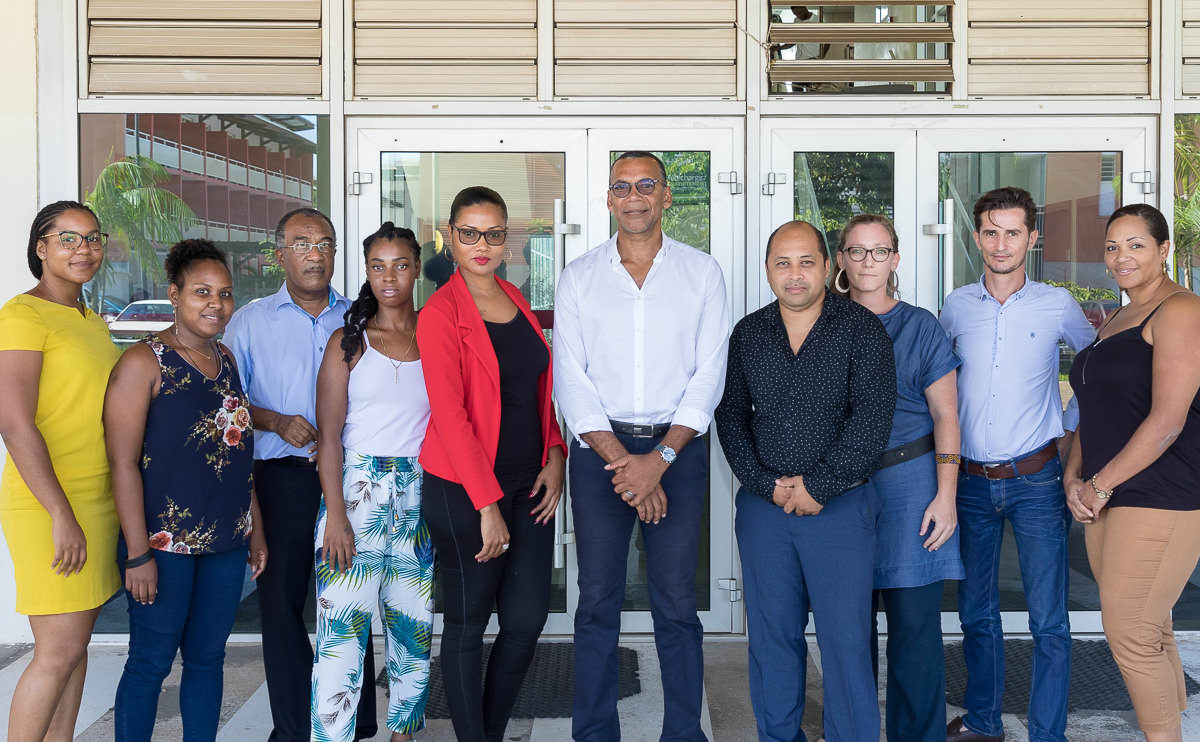The IUFC (Institut Universitaire de la Formation Continue - University Institute for Continuing Education) is a department of the University dedicated to university continuing education. It is structured and operates as a training component.
The IUFC has a large student body, representing almost a quarter of the UG's students enrolled in various courses (national diplomas, UG university diplomas, short courses, Université du Temps Libre, etc.), demonstrating the strong need for lifelong learning. Portrait of a fast-growing service.
Presentation of the Institut Universitaire de la Formation Continue and its team
The Institut Universitaire de Formation Continue (IUFC) in French Guiana was created in January 2015. Its heritage is rooted in the former Université des Antilles et de la Guyane (UAG), where Continuing Education in French Guiana has existed since 1985. Over the years, it has grown steadily, keeping pace with the increase in the number of people enrolled and the courses on offer. The department currently has thirteen staff, including 11 administrative staff and 2 teachers:
Christian Haridas
Director of Continuing Education
-
Michel Dispagne
Deputy Director
-
Olivasoa Razafindramanana
Administrative and financial manager
-
Sandra Othily
Education Officer
-
Ingrid Duchène
Education Officer
-
Leslie Salmier
Reception and guidance advisor
-
Ivanne Moges
Acting temporary manager
Melly Misère
Reception and guidance advisor
-
Jeniferous Zabeau
Responsible for temporary workers
-
Vincent Touchaleaume
Responsible for supervising and supporting mother-tongue teachers (ILM)
-
Véronique Desloriez
In charge of VAE, VAPP, VES and UTL (acronyms to be developed later)
-
Erika Béranger
Training development and engineering officer - Quality approach
By offering training courses tailored to regional needs, continuing education has a number of objectives:
- Enable access to university studies for candidates who do not hold the baccalauréat
- To contribute, through specific and short training courses, to the economic and social development of French Guyana, to the fight against social exclusion and to professional integration
- Meeting local demand for vocational training
Continuing training: courses for everyone
The IUFC offers a wide range of courses (qualifying and diploma courses from A-levels to Masters, a University of Free Time) to suit different student profiles: employees, jobseekers, the economically inactive, etc. This range is expanded according to demand, based on feedback from the various stakeholders: students, the socio-economic world, the labour market, etc.
The courses can be adapted to meet the training needs of all profiles. Courses are given in the evenings (6-8pm) and on Saturday mornings (8am-12noon).
Students are supported in three stages:
- Prior to the course, for applications for funding and administrative and pedagogical registration.
- During the course: For each course, delegates are elected (they receive a short training course at the beginning of the academic year) to represent all the students and act as an interface between them and the administration. A coordinator is also chosen (for each course) to monitor the pedagogical and administrative aspects of the course.
- Post-training: Post-training monitoring is carried out to take stock of the student's situation and, if necessary, provide guidance.
Close collaboration with the socio-economic world
The IUFC works closely with a number of partners:
- Associations: such as IMED, APEIG, C'MAFORE, GUYACLIC, Alliance Française, etc.
- Institutional: Rectorat, Pôle emploi, CTG, CHAR, CNFPT, ....
This collaboration can take the form of a pooling of skills, engineering work and/or subsidies allocated to continuing education.
Continuing training on the up
Present only in Cayenne for the first few years, the IUFC has now spread to the west and east of Guyana, from St Laurent du Maroni to St Georges de l'Oyapock. This has been made possible by partnerships with local institutions and associations. The continuing education programme also has an international presence, thanks to an agreement signed with the University of Oiapoque.
In recent years, the IUFC has been faced with a growing demand for training. To meet this demand, it increases and varies its range of courses every year. This year, it opened new DUs and is now offering some online:
- In St Laurent du Maroni: an online Pre-DAEU (Preparation for university entrance qualifications)
- In Cayenne: A DUHER (University Diploma in Disability, Environment and Rehabilitation), a DAEU and Pre-DAEU online
- In St Georges de l'Oyapock: A Pre-DU (Preparation for University Degrees)
With a catalogue of 31 degree courses (including 2 online: Pre-DAEU and DAEU), 20 qualifying courses and 12 workshops as part of the Université du Temps Libre, the IUFC offers a very wide range of courses.
The number of students increases by 30% each year. This growth could be explained by an increase in partnerships, which enable the pooling of human and material resources in line with the realities of the region, resulting in a wider range of training courses that meet people's expectations. The reform of vocational training has also had a very positive impact, as companies are now obliged to provide training for their staff. A final reason for this craze is the demographic explosion in Guyana's population. Many young students leave the school system with little or no qualifications. Continuing education is therefore a second chance for them to go back to school and improve their skills and grades within their company, or simply to retrain.
The Continuing Education Department currently has almost 1,000 pre-registered students across all its sites. The average age is 35, of whom 50% are jobseekers and the other half are employees returning to study or in professional transition.
How do you integrate continuing education?
There are two possible routes to continuing education.
- Standard procedure: on E-candidat, then the application is reviewed by an educational committee approved by the head of education. If the application is approved, the student is admitted to the course applied for.
- By validating prior learning, the IUFC offers applicants three opportunities for promotion and social recognition:
- The VAPP scheme (Validation of professional and personal experience), which allows you to enter a training course with an exemption from the diploma requirement (decree of 23 August 1985). VAPP enables you to access a course for which you do not have the required qualification (e.g. 3rd year of a degree without Bac + 2).
- The VAE system which leads to certification (Decrees of 24 April 2002 and 4 July 2017). Anyone, regardless of age, nationality, status or level of training, who can provide proof of at least 1 year's experience directly related to the qualification in question may apply for VAE. This certification, which may be a diploma, a title or a certificate of professional qualification, must be registered in the Répertoire national des certifications professionnelles (RNCP).
- All professional activities, whether salaried, self-employed, voluntary, or carried out as a volunteer, or by a person registered on the list of high-level sportspeople mentioned in the first paragraph of article L. 221-2 of the French Sports Code, or carried out as part of trade union responsibilities, a local electoral mandate or a local elective office, are taken into account in an application for validation of prior learning. In the case of activities carried out as part of initial or continuing training, periods of training in a professional environment, periods of work experience in a professional environment, practical work placements, preparation for employment and periods of practical training under an apprenticeship contract, professionalisation contract or single integration contract may be taken into account.
- Activities carried out over a period of at least one year, whether continuous or not, directly related to the vocational diploma or certificate for which the application is made will be taken into account.
- The VES system The VES (Validation des Etudes Supérieures) is a procedure for obtaining all or part of a higher education qualification by recognising studies undertaken in France or abroad. The VES is open to anyone with proof of higher education studies in a public or private institution or training organisation, in France or abroad, regardless of the type and duration of these studies.
Help to finance your training
Depending on the student's status, different types of funding are available. Below is a non-exhaustive list:
Private-sector employees :
The CPF : The Personal Training Account (formerly known as the DIF) is made up of hours. It can be used by the employee (the employer's agreement is not required if the training takes place outside working hours), throughout his or her working life, until retirement. The CPF can be used to:
- acquire a qualification (diploma, professional title, etc.),
- or acquire the knowledge and skills base,
- or to be supported in the validation of acquired experience (VAE),
- or carry out a skills assessment,
- or set up or take over a business.
CIF : Individual training leave is the right to take time off work to follow a course of one's choice. To qualify, employees must meet certain conditions and submit their request to their employer in accordance with a specific procedure.
The training plan : Depending on the company's training plan (a set of training initiatives defined as part of the policy of forward-looking management of the jobs and skills of the company's personnel), skills assessments and validation of acquired experience may be planned. In this way, employees can obtain funding for training at the IUFC if it is included in the company's training plan.
The professionalisation period : The purpose of professionalisation periods is to help employees on open-ended contracts to remain in work, by means of training courses alternating theoretical and practical instruction.
For jobseekers
Individual training leave (CIF) - CDD : The CIF-CDD allows jobseekers who have completed a fixed-term contract of less than a year to start a training course of their choice, financed by an "Opacif", in return for remuneration throughout the course.
Portability of the CPF and former DIF rights : When their employment contract comes to an end (redundancy, end of fixed-term contract, etc.), jobseekers can benefit from the financing of a training course, skills assessment or validation of acquired experience thanks to the CPF or DIF rights acquired at their last company, provided they are receiving unemployment benefit.
Individual training aid (AIF) : An individual training grant (AIF) enables jobseekers, when other collective or individual schemes cannot meet the need and in the absence of assistance from the Region, to have all or part of the educational costs of the training paid for.
Public service agents
The training plan : Each local authority and State administration draws up an annual training plan. This annual training plan sets out the professional training provided under the Staff Regulations and the ongoing training offered by the administration. It may also include training for the validation of acquired experience (VAE).
The individual right to training (DIF) : State employees still benefit from the DIF - an annual credit of professional training hours that they can use to complete certain training courses. The DIF is set at 20 hours per year for full-time employees. Training rights can be accumulated over 6 years, up to a maximum of 120 hours. If they are not used by the end of 6 years, the credit remains capped at 120 hours and the employee no longer acquires new rights.
Statutory professional training and continuing education : The training of civil servants includes both statutory training and continuing education. The aim of statutory training is to provide civil servants entering a new grade with the theoretical and practical knowledge they need to carry out their duties and to understand the environment in which they work.
The aim of continuing education is to maintain or improve the skills of civil servants throughout their careers.
Professional training periods : Professionalization periods are periods of alternating work and training. Their purpose is to encourage staff mobility by enabling them to adapt to changes in methods and techniques and to acquire new skills or qualifications. They are tailored to the specific characteristics of the job for which the employee is applying and may take place in a different job from the employee's previous assignment.
Professional training leave : Civil servants wishing to undertake training to fulfil a professional or personal project may, under certain conditions, be granted professional training leave. This leave lasts for a maximum of 3 years and is paid.
Future plans for the IUFC
The IUFC aims to continue its development. It plans to obtain the quality label: Certification de services FCU (Formation Continue Universitaire), a guarantee of the quality of its teaching; to register its University Diplomas and qualification courses in the RNCP (Répertoire National des Certifications professionnelles) to guarantee national recognition of all its diplomas for students.
It aims to offer all its training courses online in order to cover the entire country and meet all the training needs of the public. It will be extending its scope to cover the whole of French Guiana, including isolated communities such as Camopi, Maripasoula, Papaichton and Grand Santi.
It will organise a continuing education caravan each year to promote continuing education.






